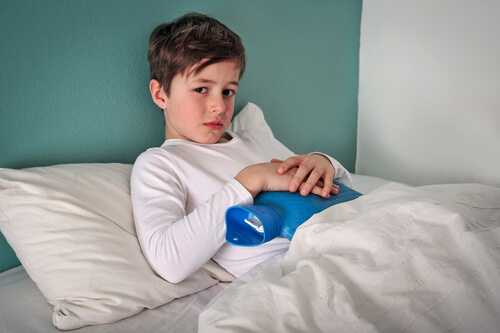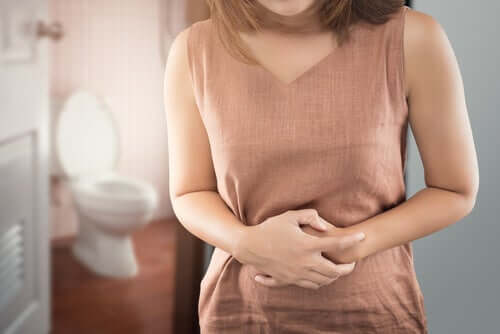Recommended Diet for Gastroenteritis


Written and verified by the nutritionist Silvia Zaragoza
Many people make dietary mistakes when dealing with gastroenteritis. That’s why we’re going to talk about the recommended diet for gastroenteritis in today’s article.
Gastroenteritis is a gastrointestinal infection that’s cause by bacteria. It can include nausea, vomiting and diarrhea. Also, because of its symptoms, you don’t have as much of an appetite. If you do feel like eating, you’re likely to stick with easily digestible foods, which is also called a soft diet.
Recommended diet for gastroenteritis
Fluid replacement, this the first goal of your recommended diet for gastroenteritis
First, it’s important to replace any fluids you’ve lost from frequent diarrhea and vomiting (more than three times a day). How can you do that? By drinking water, infusions, rice water or fat-free broth, for example.
In addition, we recommend getting electrolytes through an oral physiological saline solution. This solution will provide you with potassium, which is the mineral that we eliminate the most when we have this condition. This also provides low amounts of sodium and glucose. Have you ever tried it?

You’ve likely resorted to isotonic drinks in the past because of advice or lack of knowledge. However, although they do contain electrolytes, they’re high in sodium and sugar.
This can actually make your diarrhea worse because it will alter the sodium-potassium balance in your body. In addition, it can stimulate your digestive tract. For that reason, we don’t recommend drinking isotonic drinks.
If you don’t adequately replace the fluids you’ve lost, you’ll become dehydrated. This can endanger your body functions and can even lead to severe health consequences if not detected in time.
Before we move on to more specifics of the diet for gastroenteritis, it’s also important to mention that you’ll need to increase your zinc intake in case you have a deficiency.
Diet
The best recommendation is to eat as soon as you start to feel better and are feeling hungry. In general, you want to follow a diet that will result in very little gastric juice secretion.
Also, you want to slow down your digestive tract, so you should include foods low in fiber, lactose and fats. In addition, you should avoid acidic and spicy foods that will irritate the digestive mucosa.
Some foods we recommend are:
- Refined grains (cooked rice, potatoes, pastas and bread).
- White meat and fish, such as chicken, rabbit, sea bream, sea bass, sole, etc.
- You can test your egg tolerance by starting with just the white and then the whole thing.
- Natural yogurts, cottage cheese and fresh cheese.
- Cooked, low-fiber vegetables and greens, such as carrots, squash and zucchini.
- Cooked, roasted or stewed apples or pears, or well-ripened bananas.
- As soon as your stomach pain subsides, try small amounts of cooked, crushed or peeled legumes, such as lentils and peas. Or, try plain tofu.

In addition, you should avoid whole grains, blue fish, milk, aged and creamy cheese, all crucifers (cabbage, cauliflower, broccoli, etc.), leeks, asparagus, onions, raw vegetables in salad, raw fruits, citrus fruits and legumes (all of them, but especially chickpeas and beans).
Other measures: probiotics and prebiotics
Both the American Academy of Pediatrics and ESPGHAN (European Society for Pediatric Gastroenterology and Hepatology and Nutrition) agree that you should avoid consuming probiotics with this condition.
In addition, there’s controversy in some studies because of the strain, dose and duration. Therefore, it can’t be extrapolated except in cases caused by taking antibiotics. In the latter case, Saccharomyces boulardii NCM I-745 and Lactobacillus rhamnosus GG have shown good results and have been studied in depth.
At this point, remember that fluid and electrolyte replacement are key to recovery, especially in babies, children, pregnant women and the elderly. Lastly, it’s best to rest when you feel tired and you should know that it’s common to frequently need to use the restroom.
Many people make dietary mistakes when dealing with gastroenteritis. That’s why we’re going to talk about the recommended diet for gastroenteritis in today’s article.
Gastroenteritis is a gastrointestinal infection that’s cause by bacteria. It can include nausea, vomiting and diarrhea. Also, because of its symptoms, you don’t have as much of an appetite. If you do feel like eating, you’re likely to stick with easily digestible foods, which is also called a soft diet.
Recommended diet for gastroenteritis
Fluid replacement, this the first goal of your recommended diet for gastroenteritis
First, it’s important to replace any fluids you’ve lost from frequent diarrhea and vomiting (more than three times a day). How can you do that? By drinking water, infusions, rice water or fat-free broth, for example.
In addition, we recommend getting electrolytes through an oral physiological saline solution. This solution will provide you with potassium, which is the mineral that we eliminate the most when we have this condition. This also provides low amounts of sodium and glucose. Have you ever tried it?

You’ve likely resorted to isotonic drinks in the past because of advice or lack of knowledge. However, although they do contain electrolytes, they’re high in sodium and sugar.
This can actually make your diarrhea worse because it will alter the sodium-potassium balance in your body. In addition, it can stimulate your digestive tract. For that reason, we don’t recommend drinking isotonic drinks.
If you don’t adequately replace the fluids you’ve lost, you’ll become dehydrated. This can endanger your body functions and can even lead to severe health consequences if not detected in time.
Before we move on to more specifics of the diet for gastroenteritis, it’s also important to mention that you’ll need to increase your zinc intake in case you have a deficiency.
Diet
The best recommendation is to eat as soon as you start to feel better and are feeling hungry. In general, you want to follow a diet that will result in very little gastric juice secretion.
Also, you want to slow down your digestive tract, so you should include foods low in fiber, lactose and fats. In addition, you should avoid acidic and spicy foods that will irritate the digestive mucosa.
Some foods we recommend are:
- Refined grains (cooked rice, potatoes, pastas and bread).
- White meat and fish, such as chicken, rabbit, sea bream, sea bass, sole, etc.
- You can test your egg tolerance by starting with just the white and then the whole thing.
- Natural yogurts, cottage cheese and fresh cheese.
- Cooked, low-fiber vegetables and greens, such as carrots, squash and zucchini.
- Cooked, roasted or stewed apples or pears, or well-ripened bananas.
- As soon as your stomach pain subsides, try small amounts of cooked, crushed or peeled legumes, such as lentils and peas. Or, try plain tofu.

In addition, you should avoid whole grains, blue fish, milk, aged and creamy cheese, all crucifers (cabbage, cauliflower, broccoli, etc.), leeks, asparagus, onions, raw vegetables in salad, raw fruits, citrus fruits and legumes (all of them, but especially chickpeas and beans).
Other measures: probiotics and prebiotics
Both the American Academy of Pediatrics and ESPGHAN (European Society for Pediatric Gastroenterology and Hepatology and Nutrition) agree that you should avoid consuming probiotics with this condition.
In addition, there’s controversy in some studies because of the strain, dose and duration. Therefore, it can’t be extrapolated except in cases caused by taking antibiotics. In the latter case, Saccharomyces boulardii NCM I-745 and Lactobacillus rhamnosus GG have shown good results and have been studied in depth.
At this point, remember that fluid and electrolyte replacement are key to recovery, especially in babies, children, pregnant women and the elderly. Lastly, it’s best to rest when you feel tired and you should know that it’s common to frequently need to use the restroom.
All cited sources were thoroughly reviewed by our team to ensure their quality, reliability, currency, and validity. The bibliography of this article was considered reliable and of academic or scientific accuracy.
- American Academy of Pediatrics. Reports on use of probiotics and prebiotics in children. American Family Physician. 2011. 83 (7): 849-852.
- King CK, Glass R, Bresee JS, Duggan C; Centers for Disease Control and Prevention. (2003) Managing acute gastroenteritis among children: oral rehydration, maintenance, and nutritional therapy. MMWR Recomm Rep, 52(16): 1-16.
- Lo Vecchio A, Dias JA, Berkley JA, Boey C, Cohen MB, Cruchet S et al. (2016) Comparison of Recommendations in Clinical Practice Guidelines for Acute Gastroenteritis in Children. J Pediatr Gastroenterol Nutr, 63 (2): 226-35.
- Maldita ciencia. Bulos y mitos sobre la diarrea: por qué beber Aquarius no es lo más adecuado y qué es de verdad una dieta blanda. [Publicado el 27 de diciembre de 2019] [Consultado el 26 de febrero de 2020] Disponible en: https://maldita.es/malditaciencia/bulos-y-mitos-sobre-la-diarrea-por-que-beber-aquarius-no-es-lo-mas-adecuado-y-que-es-de-verdad-una-dieta-blanda/
- Mayo Clinic. Gastroenteritis vírica (gripe estomacal). Enero 2022.
- National Institute of Diabetes and Digestive and Kidney Diseases. Alimentación, dieta y nutrición para la gastroenteritis viral (gripe estomacal). U. S. Department of Health and Human Services. Mayo 2018.
- Vandenplas, Y. (2016) Probiotics and prebiotics in infectious gastroenteritis. Best Pract Res Clin Gastroenterol., 30(1): 49-53.
This text is provided for informational purposes only and does not replace consultation with a professional. If in doubt, consult your specialist.








